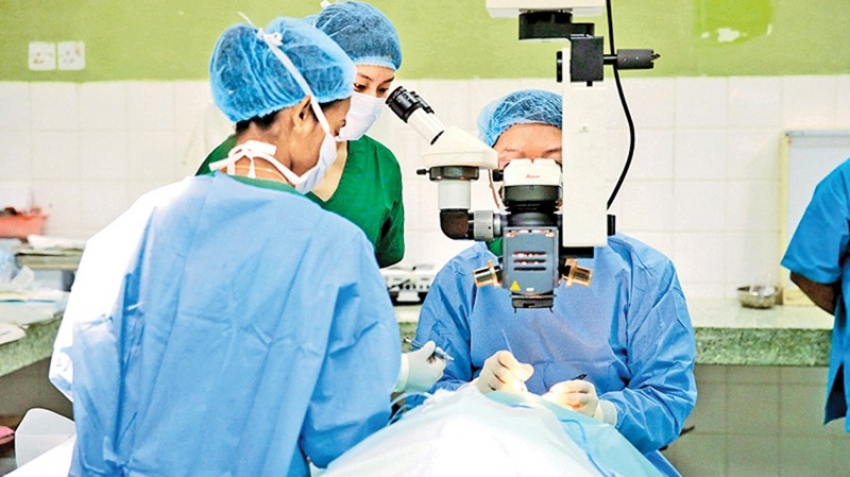From 2015, under the guidance of Health, Nutrition and Indigenous Medicine Minister Dr. Rajitha Senaratne, the Health Ministry took steps to provide quality intraocular lenses, coronary stents, and cochlear and prosthetic implants free for all patients who seek medical treatment from state hospitals.
This initiative made Sri Lanka’s free health service meaningful as it was not free in the past. It was proposed to obtain Rs. 10.5 billion from the budget to purchase coronary stents and eye lenses. Meanwhile, the Ophthalmologists College of Sri Lanka has agreed to continue cataract surgeries at state hospitals after normal government working hours (8.00 am to 4.30 pm).
Ophthalmologists agreed to continue surgeries responding to a request made by Health Minister Senaratne during a recent meeting. This new measure will cut down the long waiting list that exists for cataract surgeries in the state sector.
It is estimated that around 1.2 million patients suffer from some sort of eye issue in Sri Lanka.
Eye lenses required for patients who obtain treatment from state hospitals are imported from the US and provided free.
According to Minister Senaratne, 95 percent of consultant eye surgeons supported the programme which provided free lenses for patients who seek treatment from state hospitals.
The Minister said that a survey conducted by the Health Ministry in 2014 found out that one million people suffer from some sort of eye problem.
Insertion of coronary stents
Now, surgeries are performed round the clock at the National Hospital of Sri Lanka (NHSL) to insert coronary stents (catheterisation) for patients who suffer from heart disease.
A five-member committee headed by Health Services Director General Dr. Anil Jasinghe has been appointed by the Health Minister to purchase drugs and stents required for catheterisation according to a new system. The committee report will be handed over to the Minister in two weeks. These details were disclosed during a meeting held at the Health Ministry.
In January, 591 heart surgeries were performed at the NHSL during the day and 224 at night. In February, 549 day surgeries and 230 night surgeries were performed. In March, 545 day surgeries and 186 night surgeries were performed. Minister Senaratne made a request to the NHSL to continue night surgeries in order to offer a better service to heart patients on the waiting list.
The cardiologist attached to the Kalmunai Ashraff Memorial Hospital informed the Health Minister that in the last year, no heart patient died after the steps were taken by the Health Ministry to treat heart patients swiftly.
Cardiologists informed that earlier, around five to six heart patients died daily, but now (after providing the injection, drugs, medical equipment and human resources), only about one heart patient dies daily.
The Health Minister took steps to reduce the high prices of coronary stents.
The prices of normal and medicated stents were reduced by Rs. 51,000 and Rs. 245,000 respectively. In addition, the special injection, Tenecteplase has been provided to state hospitals to save the lives of heart patients who come to hospitals within two hours from the time of the heart attack.
Heart surgeries are performed round the clock and monthly about 450 to 500 heart surgeries are performed in state hospitals. Now, more and more heart patients seek treatment from state hospitals due to the availability of free stents, other modern medical equipment and drugs.
The gazette notification on reducing the prices of coronary stents was issued under the National Medicines Regulatory Authority (NMRA) Act Number 05 of 2015.
After the price reductions, the maximum retail price of a bare-metal stent and a drug-eluting stent came down to Rs. 24,000 and Rs. 105,000, respectively. A bare-metal stent, for instance, was Rs. 75,000 earlier. Now, patients can save Rs. 51,000. The prices of stents were reduced by Rs. 195,000 from Rs. 300,000 to Rs. 105,000.
Cochlear implant surgery
Sri Lanka is one of the very few countries in the world that carries out millions of rupees worth of cochlear implant surgeries free. The less the degree of disability among the population, the higher the productivity of the country.
It is not worth if we have to pay for certain health services obtained from the state sector. Then we cannot consider it as a free health service. But now people do not need to suffer in silence without money to purchase lenses and stents as they can walk into any major state hospital and walk out with healthy eyes and hearts.
****
An intraocular lens (IOL) is a lensimplanted in the eye as part of a treatment for cataracts or myopia. The most common type of IOL is the pseudophakic IOL. These are implanted during cataract surgery, after the cloudy eye’s natural lens (colloquially called a cataract) has been removed. The pseudophakic IOL provides the same light focusing function as the natural crystalline lens. The second type of IOL, more commonly known as a phakic intraocular lens (PIOL), is a lens which is placed over the existing natural lens and is used in refractive surgery to change the eye’s optical power as a treatment for myopia (nearsightedness). IOLs usually consist of a small plastic lens with plastic side struts, called haptics, to hold the lens in place in the capsular bag inside the eye. IOLs were conventionally made of an inflexible material (PMMA), although this has largely been superseded by the use of flexible materials. Most IOLs fitted today are fixed monofocal lenses matched to distance vision. However, other types are available, such as multifocal IOLs that provide the patient with multiple-focused vision at far and reading distance, and adaptive IOLs that provide the patient with limited visual accommodation.
****
A coronary stent is a tube-shaped device placed in the coronary arteries that supply blood to the heart, to keep the arteries open in the treatment of coronary heart disease. It is used in a procedure called percutaneous coronary intervention (PCI). Coronary stents are now used in more than 90 percent of PCI procedures. Stents reduce angina (chest pain) and have been shown to improve survival and decrease adverse events in an acute myocardial infarction. Similar stents and procedures are used in non-coronary vessels (e.g., in the legs in peripheral artery disease).




















